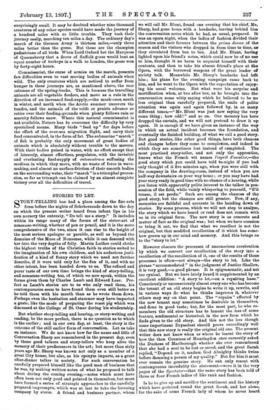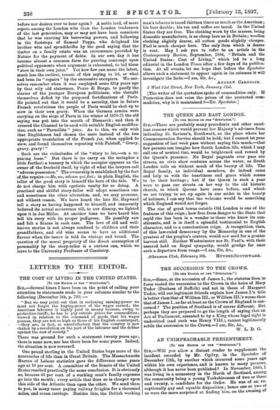STORIES TO LET.
STORY-TELLING has had a place among the fine arts from before the nights of Scheherazade down to the day on which the present writer heard from infant lips in his own nursery the entreaty, "Do tell me a story." It includes within its range many of the forms of the sister-art of nonsense-writing, whether of pen or pencil, and it is the more comprehensive of the two, since it can rise to the height of the most serious apologne or parable, as well as beyond the domains of the Muse of Nonsense, while it can descend with her into the very depths of folly. Martin Luther could clothe the highest truths of the Christian faith in stories suited to the imagination of his own children, and his audacious justi- fication of a kind of funny story which we need not further describe, if it were told only for the fan of it, and with no other intent, has been handed down to us. The refined and purer taste of our own time brings the kind of story-telling, and nonsense-writing too, of which we now speak, within the forms given them by Charles Lamb and Edward Lear. Per- fect as Lamb's stories are to us who only read them, his contemporaries seem to have found them even still better as he told them with his month than as he wrote them down. Perhaps even the hesitation and stammer may have imparted a gusto, like the mode of preparing the roast pig which was discussed at the College of St. Omer during his studentship.
Bat whether story-telling and hearing, or story-writing and reading, be the more perfect, there is no question as to which is the earlier ; and in our own day, at least, the story is the outcome of the still earlier form of conversation. Let us take an instance. We do not know how far the name and title of Conversation Sharp are remembered in the present day, even by those good talkers and story-tellers who keep alive the memory of their predecessors in the art; but more than sixty years ago Mr. Sharp was known not only as a member of a great City house, but also, as his eponym imparts, as a great after-dinner talker in society. For such conversation he carefully prepared himself like the good man of business that he was, by making written notes of what he proposed to talk about during the coming evening,—notes which must have often been not only good and pointed in themselves, but must have formed a series of strategic approaches to the carefully prepared impromptu, which was at last to take the listening company by storm. A friend and business partner, whom
we will call Mr. Blunt, found one evening that his chief, Mr. Sharp, had gone home with a headache, leaving behind hive the conversation notes which he had, as usual, prepared. It was an opera night, when the ladies of fashion divided their attention and their favours between the prima donna of the season and the visitors who dropped in from time to time, as they circulated from box to box. And Mr. Blunt, having lighted upon his friend's notes, which could now be of no use to him, thought it no harm to acquaint himself with their contents, and then to take his absent friend's place at the Opera, with the borrowed weapons of the great leader of society talk. Meanwhile Mr. Sharp's headache had left him ; his plans for the evening campaign came back to him, and he went to the Opera with the expectation of enjoy- ing his usual welcome. But what were his surprise and mortification when, at box after box, as he brought into the conversation some witty saying which he believed to be no less original than carefully prepared, the smile of polite attention was again and again followed by, in as many different tones,—" Mr. Blunt was just now saying the very same thing ; how odd!" and so on. Our memory has here dropped the curtain, and we will not pretend to draw it up again. It is enough if we have given an instance of the way in which an actual incident becomes the foundation, and eventually the finished building, of what we call a good story. Bat good stories, like other good things, have both chances and changes before they come to completion, and indeed in which they are sometimes lost instead of completed. The most practised story-teller, and not only the apprentice, knows what the French wit names l'esprit d'escalier,—the good story which you could have told to-night if you had only thought of it five minutes ago, when you were still with the company in the drawing-room, instead of when you are half-way downstairs on your way home ; or you may have had your story ready in good time with no chance of a hearing, while you listen with apparently polite interest to the talker in pos- session of the field, while vainly whispering to yourself, " S'il tousse, il eat perdu." Such are among the chances of the good story, but the changes are still greater. Few, if any, memories are faithful and accurate in the handing down of stories. By some process, which we will not stop to analyse, the story which we have heard or read does not remain with us in its original form. The new story is as concrete and matter of fact as the original was ; but when we have occasion to bring it out, we find that what we recollect is not the original, bat that modified recollection of it which has some- how grown up in our mind and memory. And this brings us to the "story to let."
However obscure the processes of unconscious cerebration by which we convert our recollection of the story into a recollection of the recollection of it, one of the results of these processes is often—not always—the story to let. Like the phrase " accommodated " in the judgment of Justice Shallow, it is very good,—a good phrase. It is epigrammatic, and not too cynical. But we have lately heard it supplemented by an excellent addition : "A story to let,—on a repairing lease." Consciously or unconsciously almost every one who has become the tenant of an old story begins to write it up, rewrite, and in various ways do what he thinks improves it, whatever others may say on that point. The " repairs " effected by the new tenant may sometimes be desirable in themselves, and done in good taste; but, for the most part, he who re- members the old structure has to lament the loss of some feature, sentimental or historical, in the new form which he finds given to the old story. And this not the less though some impertinent Dryasdust should prove exceedingly well that this new story is really the original old one. The present writer does not know when or where he learnt the story of how the then Countess of Huntingdon once earnestly asked the Duchess of Marlborough whether she ever remembered that she had a soul to be lost or saved, and the great Sarah replied, "Depend on it, madam, God Almighty thinks twice before damning a person of my quality." But for him it must ever remain the genuine story. He can only resent with contemptuous incredulity the statement—were it in the very pages of the Spectator—that the same story has been told of three or four French ladies of like rank and fashion.
Is he to give up and sacrifice the sentiment and the history which have gathered round the great Sarah, and her alone, for the sake of some French lady of whom he never heard
before nor desires ever to hear again ? A noble lord, of more repute among the London wits than the London tradesmen of the last generation, may or may not have been conscious that he was exerting his borrowing powers, and following in the footsteps of Samuel Pepys, who delighted his brother wits and spendthrifts by the good saying that the timber on a family estate was an excrescence provided by Nature for the payment of debts. In our own day it has become almost a common form for pouring contempt upon political opponents when argument is exhausted, to bid them "stew in their own juice." Yet how few can name the latest, much less the earliest, tenant of this saying to let, or what had been its " repairs " by the successive occupiers. We our- selves remember when it was employed some fifty years ago by that wily old statesman, Pozzo di Borgo, to pacify the alarms of the younger European politicians, who thought themselves defied by the proposed fortifications of Paris. He pointed out that it would be a security, that in future French revolutions the people of Paris would be shut up to stew in their own gravy. When the German armies were carrying on the siege of Paris in the winter of 1870-71 the old saying was put into the month of Bismarck ; and then it crossed the Channel to be used with suitable English modifica- tion, such as " Parnellite " juice. As to this, we only wish that Englishmen had chosen the more instead of the less appropriate translation of the French jus, when applied to stew, and found themselves repeating with Falstaff, "Gravy, gravy, gravy ! "
• Such are the vicissitudes of the "story to let,—on a re- pairing lease." But there is (to carry on the metaphor a little further) a tenancy in which the occupier appears as the owner of the freehold itself, by right of what the lawyers call "adverse possession." The ownership is established by the fact of the repairs me, adsunt qui fe,ci ; in plain English, the teller of the good story is himself the hero of the tale. We do not charge him with egotistic vanity for so doing. A practised and skilful story-teller will adopt sometimes one and sometimes the other alteration, and, we may presume, not without reason. We have heard the late Mr. Hayward tell a story as having happened to himself, and innocently believed its actual occurrence till, to our dismay, we lighted upon it in Joe Miller. At another time we have heard him tell his story with its proper pedigrees. He possibly saw and felt a fitness in each case. The love of old and well- known stories is not always confined to children and their grandfathers, and old wine seems to have an additional flavour when the taster is told its vintage and brand. The question of the moral propriety of the direct assumption of personality by the story-teller is a curious one, which we leave to the University Professor of Casuistry.



































 Previous page
Previous page